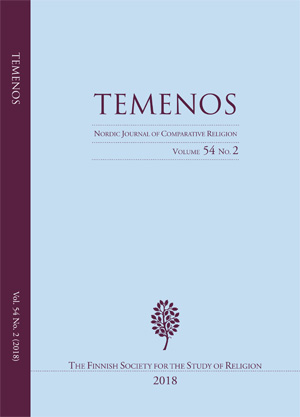Old Customs
The Vernacular Word siðr and Its Cognates in the Study of (Lived) Religion in Viking and Medieval Scandinavia
DOI:
https://doi.org/10.33356/temenos.69935Abstract
Although they highlight the Norse (religious) term siðr ‘custom’ and its cognates, some researchers of pre-Christian Scandinavia suggest that the concept of religion involves a Christocentric discourse and should be used cautiously, or even only for Christianity. Some scholars therefore recommend a categorical distinction between pre-Christian (religious) siðr and Christian religion. This paper contributes to this ongoing discussion. I argue that while it is meaningful to highlight the term siðr and its cognates, the distinction between pre-Christian siðr and medieval Christian religion is problematic. 1) While siðr had various meanings in vernacular language, the current debate emphasises only its religious aspect, thus turning the indigenous term into an implicit etic concept. 2) The word siðr and its cognates were also used in medieval Scandinavian languages as designations for Christianity, and hence, the categorisation of pre-Christian siðr and medieval Christian religion is misleading. 3) The distinction between popular siðr and formal religion is fundamentally based on the two-tier model of popular/folk religion–religion. 4) The vernacular (religious) word siðr in the sense of ‘religious customs, the religious aspects of the conventional way of life’ and the heuristic category of (lived) religion are in fact complementary in the study of religion in both Viking and medieval Scandinavia.
Downloads
Published
How to Cite
Issue
Section
License
Copyright (c) 2018 Temenos - Nordic Journal of Comparative Religion

This work is licensed under a Creative Commons Attribution-NonCommercial-NoDerivatives 3.0 Unported License.
Author's Guarantee
- The Author acknowledges that the Work will be publicly accessible on the Internet and that such access will be free of charge for the readers.
- The Author guarantees that the Work is her/his original work that has not been published before and cannot be construed as copying or plagiarism. Furthermore, the Author confirms that the Work contains no statement that is unlawful, defamatory or abusive or in any way infringes the rights of others.
- The Author confirms that she/he has secured all written permissions needed for the reproduction in the Publication of any material created by a third party.
User Rights
Under the CC BY 4.0 license, the Author/s and users are free to:
- Share — copy and redistribute the material in any medium or format,
- Adapt — remix, transform, and build upon the material for any purpose, even commercially,
- However, the Work must be attributed to the original Author and source of publication.
The license of the published metadata is Creative Commons CCO 1.0 Universal (CC0 1.0)
Author Rights
The Authors maintain the right to:
- copyright, and other proprietary rights relating to the Work,
- the right to use the substance of the Work in future own works,
- the right to self-archiving/parallel publishing (publisher's PDF allowed).
Rights of Publisher
- The Publisher reserves the right to make such editorial changes as may be necessary to make the Work suitable for publication in the publication, e.g. style of punctuation, spelling, headings and the like.
- The Publisher will publish the Work if the editorial process is successfully completed and reserves the right not to proceed with publication for whatever reason.
- The publication entitles the author to no royalties or other fees. This agreement will be governed by the laws of Finland.






